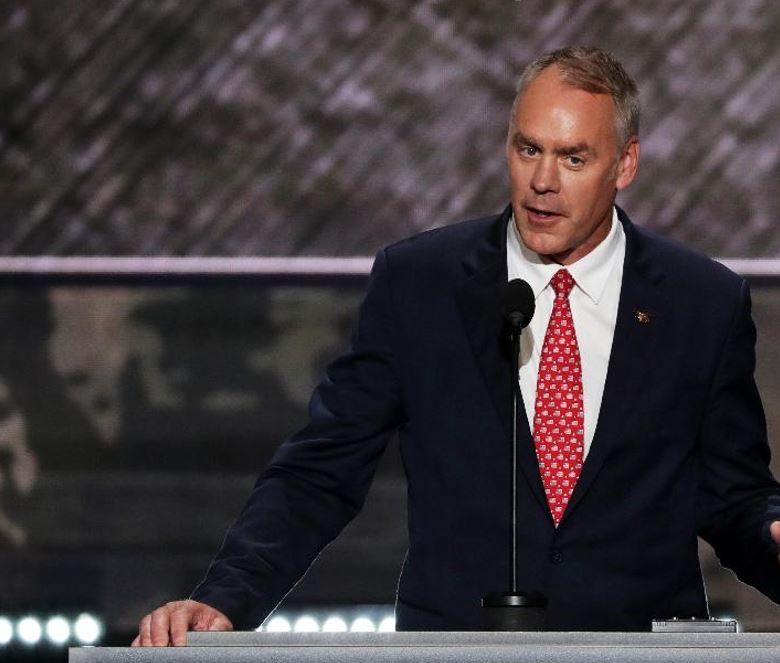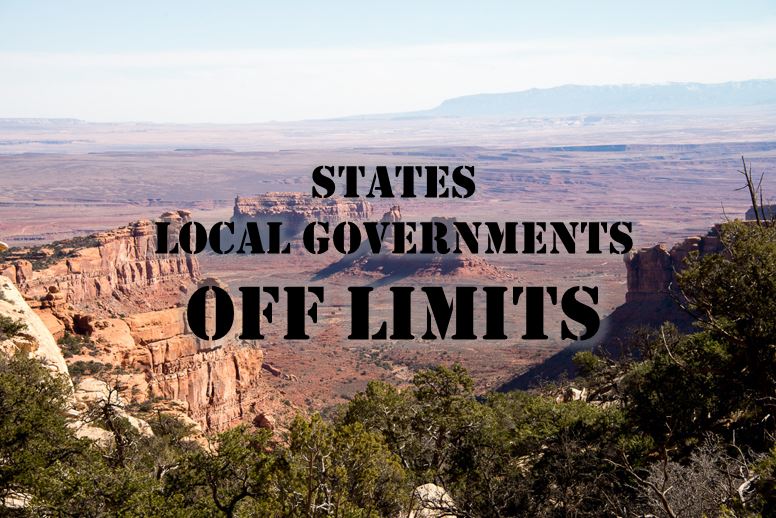After lecturing Trump on the abuse of executive power, President Obama exercised his executive power to set aside over 1.5 million acres as the Bears Ears National Monument in southeastern Utah and Gold Butte National Monument near Las Vegas. These two monuments bring Obama’s total to 30, more than any other president.
As Susie Philemon, Navajo tribe member, explains, “The federal government again is going to take something, a land that truly belongs to us. They are going to take it away from us again.”
A Litmus Test for Trump’s Public Lands Policies
After lecturing Trump on the abuse of executive power, President Obama exercised his executive power to set aside over 1.5 million acres as the Bears Ears National Monument in southeastern Utah and Gold Butte National Monument near Las Vegas. These two monuments bring Obama’s total to 30, more than any other president. Both were created using executive powers granted under the Antiquities Act of 1906, and both were opposed by nearly all members of the Utah and Nevada congressional delegations, many state leaders and many Native Americans. As Susie Philemon, Navajo tribe member, explains, “The federal government again is going to take something, a land that truly belongs to us. They are going to take it away from us again.”

Now opponents await Trump’s inauguration, wondering whether he can or will undo the monument designations. The answer to the question is ambiguous because Trump has said little about how he will deal with public land policy, but his interior secretary designate, freshman congressman Ryan Zinke (R-MT), does have a record on public land issues. His record provides a basis on which to grade how the Trump administration might deal with the massive federal estate, including national monuments.
For example, Zinke recently held listening hearings on a House bill that would limit executive power to unilaterally establish national monuments under the Antiquities Act as Obama did on Wednesday. The Protecting Agriculture, Conservation, and Recreation and Empowering States (ACRES) bill would require state governors, adjacent counties and adjacent property owners to approve monument designations. For supporting this bill, Zinke deserves an A for federalism and for respecting private property rights.
Other proposed legislation points to more pragmatic approaches to public land management. Last March, Zinke voted for the Sportsmen’s Heritage and Recreation Enhancement Act. It would allow public land agencies to build temporary roads, construct dams and log in wilderness areas. Environmental groups oppose any development in wilderness areas, but timber left unmanaged provides tinder for massive wildfires, making it a far bigger threat to wilderness lands than chainsaws. Give Zinke another A for common sense land management.
In 2015, Zinke voted for the Residual Federal Forest Act, which environmental groups say would do “an end run around bedrock environmental laws” by limiting “the public’s ability to have a say in the future of their forests.” In other words, it would reduce the ability of environmental groups to file suits under the Forest Land Policy Management Act, something that currently stifles sound management. Again, give Zinke an A for pragmatism.

The transfer of federal land to states is another controversial issue in the West, where the Bureau of Land Management controls more than half of the land in Nevada, Oregon, Utah, Idaho and Alaska. On transfers, Zinke has tried to position himself as an opponent. Environmentalists praise him for this, but the Wall Street Journal calls it “deference to Washington landlords.”
He would get an A+ for federalism if he supported transfers, but his vote in 2015 for Self-Sufficient Community Lands Act deserves some credit for pragmatism. That act would transfer management of millions of acres of federal land to states under a management board appointed by state governors. Given that large-scale transfers are unlikely to pass congressional muster, Zinke still deserves an A for his efforts to devolve more authority to the states.
Finally, the Department of Interior oversees 52.7 million acres belonging to American Indians. Hence, Zinke could have a tremendous positive effect on reservation economies. The DOI holds hostage billions of dollars in energy development on tribal lands. A 2015 Government Accountability Office report concluded that “the added complexity of the federal process stops many developers from pursuing Indian oil and gas resources development” by requiring significantly more regulatory steps that “increase development costs, and add to the timeline for development.”
Zinke and his Senate colleague Steve Daines (R-MT) introduced the Certainty for States and Tribes Act in May 2016. The act would reestablish the Royalty Policy Committee, a body that would include state governors, their appointees and tribal leaders, to advise the secretary of Interior on energy policy issues. The chairman of the Crow Tribe, Darrin Old Coyote, praised the bill as “vital to the Crow people.” This act fits perfectly with Trump’s newly formed Native American Affairs Coalition, which is seeking to remove suffocating DOI regulations on Indian lands. Another A for Zinke.
Zinke’s environmental skeptics are likely to oppose his confirmation as interior secretary on the grounds that we will encourage resource development over wilderness designation and delegate more authority for land management to the states. But these are precisely the reasons Zinke should be approved and why we might expect him and the administration to get straight As.
Terry L. Anderson

Free Range Report



We at American Mining Rights Association have much in common with the folks who love our public lands as well. Our 10,000+ members and followers are now linked to Free Range Report and we are pleased to see the article on Zinke. We started vetting Mr. Zinke back when his name was tossed into the ring with Forrest Lucas (our choice) and have found Mr. Zinke to, in his past actions, support public land use. More importantly, Mr. Zinke seems to listen, and that is refreshing in this age of Pelosi’s, Reid’s, McCain’s and Boxers who ignore the will of the people and are more interested in strict ideology instead of country first.
The small mining community reaches out to ranchers, hunters, off-roaders, fishermen and others who use our public lands, it is long past time we all join hands and return our country back to those who own the lands….the people.
Mr. Shannon Poe, President, AMRA
Thank you Shannon for your words. I myself belong to several of these groups and have been saying for years its time to unite !! what each group has been trying to do is not working on there own. We need to unite on the big picture and that is keeping our lands open. We need to change the way ranching ,logging and mining are dealt with.
Jeff McAuliff ,President 5150 metal recovery